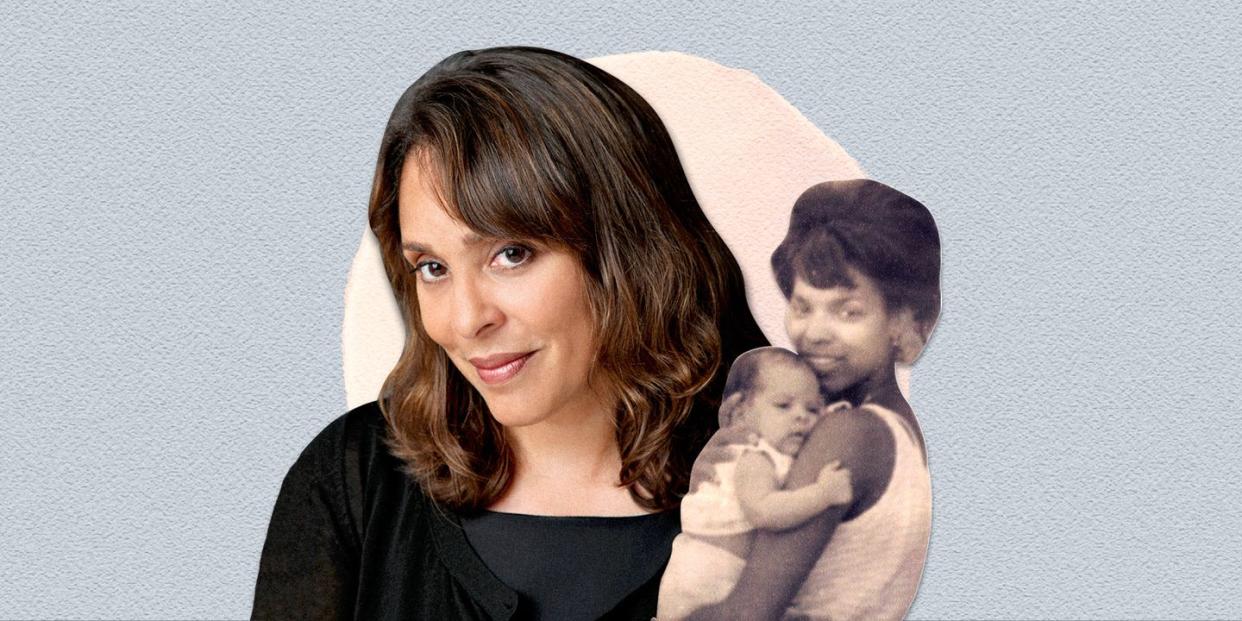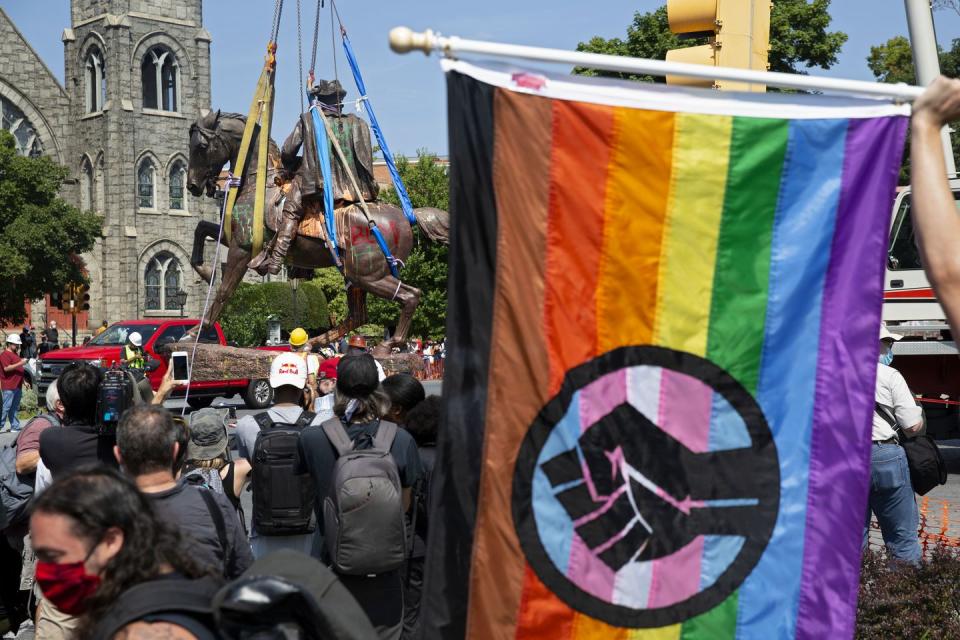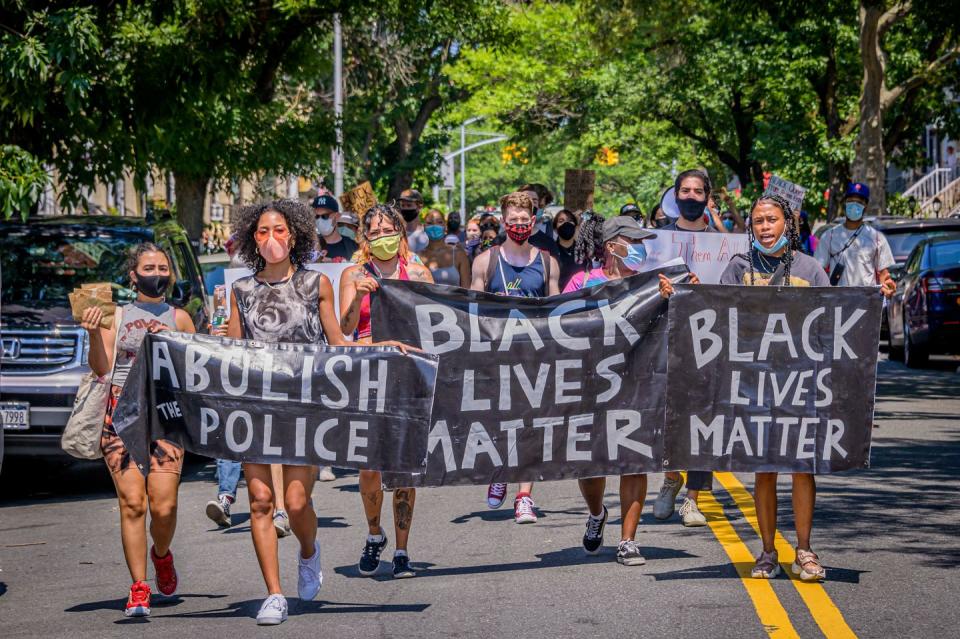Natasha Trethewey's Search for Identity Has Always Run Parallel to The Nation's

There has always been a terrifying sense of kismet when it comes to Natasha Trethewey's life and career. Born to a Black mother and a white father in Mississippi on April 26, 1966, on the one hundredth anniversary of the state's celebration of Confederate Memorial Day, the nation's grapple with its racial divide would loom over her childhood as ferociously as it did her birth.
The U.S. Poet Laureate's ensuing search for identity has informed much of her brilliant oeuvre, including her Pulitzer Prize-winning 2006 collection of poetry, Native Guard, which retold the story of the Black Civil War heroes from her hometown of Gulfport, Mississippi. But Trethewey's search for identity finds its most immediate testimony in her prose memoir, Memorial Drive. One of Esquire's Best Books of 2020, the work confronts the brutal murder of her mother, committed at the hands of her second husband, as well as the searing, unique pain of growing up, as Trethewey writes, a "child of miscegenation."
That it debuts in the summer of 2020 is a second alignment of the stars not lost on the author. "Not only is it that all of these [race-based topics] are coming to a head right now," she tells Esquire, "but also, the pandemic has increased the number of cases of domestic violence. People are sheltering in place often with their abusers because they have no choice. So, to see these things intersecting in such a powerful and traumatic way is difficult, but it also suggests that maybe we'll be able to have a conversation and a reckoning with it that we haven't quite had before."
In a wide-ranging interview conducted in advance of her memoir's release, Trethewey discussed the painful exploration of her mother's case, our misremembered national history, and the ways in which white supremacy is inscribed in our country.
Esquire: While your personal history has appeared in pieces of your poetry, a memoir in prose of your mother’s murder feels entirely different in scope. When did you know it was time for you to attempt this retelling?
Natasha Trethewey: After I won the Pulitzer Prize, after I was appointed Poet Laureate, and there were more and more articles in newspapers and magazines about me, my backstory became part of the article. And when the backstory was written about, my mother was always included almost as an afterthought—like this footnote murder victim. It felt reductive to me. She was just given like, one line, and there was so much more attention placed on my father, who was still alive at that time.
ESQ: Because he’s also a poet?
NT: Right. People could think, well, the line descends straight through him to her. And he’s also my white parent, which complicates things too. And he’s a man. I needed to show that whereas my loving father was certainly important and encouraging of me to become a writer, the reason that I am a writer is that tremendous loss from when I was 19.

ESQ: The book opens with the scene of your mother's murder, and then flashes back to your earliest years, building towards this conclusion we already know and dread. Why that structure?
NT: That, for me, is connected to what would happen when I would get introduced for readings of Native Guard. My introducer, often a very well-meaning person giving a good introduction, would say, “This book is about three things: It’s about her growing up Black and biracial in the Deep South; it’s about the history of these Black soldiers in the Civil War and Mississippi’s forgotten history; and it’s about her mother’s murder.” In no way was that book about my mother’s murder. But there’s a moment when someone says the word murder that people are shocked. I would feel like I was walking up to the podium with that word hanging in the air.
I really wanted to get that out in the open in the book so that it wasn’t exactly open to just the interests of true crime or thrillers, in that way. I wanted, as much as possible, to reveal to readers my experience of trying to go backwards into this very difficult thing that I tried to forget in order to survive. And I had hoped that, even though you know she’s going to die, a reader could be just as interested and hopeful that she survived, even though you know it can never be.
ESQ: It’s interesting you bring up hope now, because I do feel that it’s a throughline in all of your collections. No matter how tough the topic is—from our nation grappling with its history or you with your own story—your optimism never wavers.
NT: You saying that reminded me of a moment where I was stunned that someone could misunderstand that every work of art that I create is an act of hope. I gave a reading years ago from Native Guard—I think at Yale—and a woman came up to me afterwards and she said, "Do you have any hope?" And I thought, how could you have just listened to everything I read and still have to ask that question? And I've since tried to figure out where it comes from. Did she mean literally me, individually, who has seemed to have had such a difficult life in her mind? Or did she mean the things I presented to her about us in our country are so devastating that it leaves her questioning whether or not we can fix this?
The poem, to me, is the most hopeful act there is, because it is generative. It is not hopeless, because it is making something out of what might seem otherwise destructive to who you are. So anytime I'm making something, including this memoir, it is about that, because it also says, I'm still here; I am resilient. I have survived this, and we can survive whatever reckoning we have to have with empathy.
ESQ: This idea of distrustful or hazy memories is really compelling. It shows up here, in Memorial Drive, as you try to piece together certain events, but also elsewhere in your anthology. In Beyond Katrina, there were memories of your grandmother’s recollections of different hurricanes that had gotten confused. It’s hard not to draw a parallel with our national memory, which people are increasingly realizing has been infused with so many lies and so much confusion.
NT: I do think it’s a parallel journey, which is one of the reasons that, in the very opening book in the prologue, I put two things side by side: my mother's death on Memorial Drive and the nation's largest monument to the Confederacy that over-shadowed it. They’re on a parallel track to me, to how we reckon with the past and how we remember it, how we memorialize it going forward. Those two things are always connected for me. They're my two existential wounds.
ESQ: As a nation, what do we most need to start remembering correctly?
NT: People need to remember that you can honor your ancestors, you can honor people in your family that you love, but who were flawed. You can honor the people, even though they've made terrible mistakes and were on the wrong side of history. I gave a reading down in Tennessee, and I had a young man come up to me afterwards. And he was nearly in tears, I think, because he was trying to reckon with the things that I was saying about historical memory, about the Confederate monuments inscribed on the landscape, and about his own ancestors who had fought for the Confederacy. I wanted to encourage him both to be critical of the fiction that has been inscribed in the aftermath of the Civil War and in response to Black advancements in civil rights, but also remember that you can still honor your grandfather. If that means putting these monuments in graveyards or museums, where we tell a fuller version of the story, then that's what we need to do.
ESQ: The tearing down of monuments has garnered a lot of headlines this summer. What do you see, when you look at those demonstrations?
NT: It is that frustration. The places where people did decide to take them down peacefully, like when the mayor of New Orleans took one down, it's worked out. Right now, we're seeing people who are so frustrated with not only the ongoing messages of second-class citizenship that these monuments speak to African-Americans, but also the unwillingness of people in this contemporary moment to acknowledge that that is what they're doing. And how they dig their heels in about “heritage, not hate.” How it's somehow a belief that it’s our history, when the history they inscribed is already a fiction.
Imagine if we had a landscape inscribed all around the South and the North with monuments to the nearly 200,000 African-American soldiers who fought for the union in Civil War, who fought to preserve the union, who fought for their own freedom—that would have told us a very different story. We may not be here where we are right now with people having to insist that Black lives matter if we knew that they matter just as much because their history was inscribed just as much. And not that it's just their history. It's our shared history as Americans, and one we ought to be really proud of.

ESQ: At one point in the book, you reprint the transcript of your mother’s taped phone call with her former husband, who would eventually kill her. She was recording the conversation to try to get protection from the police. For me, it’s the most powerful section of the memoir.
NT: I went back and forth with myself for a little bit about it, just because I felt like someone might look at that and say, "Well, she's not doing the hard work of writing this story. She's just showing us the evidence." I'm happy to hear you say that that is not the reaction you had, because I did finally decide that I could tell you how wonderful she was, and resilient, and patient, and just the power of her ability to be focused [by using the evidence]. I think you needed to see it. You needed to see it in her own words. You needed to see that I wasn't trying to create a monster in describing him.
ESQ: It’s obvious that the system failed your mother. It seems like you knew that at the time of her murder, but it certainly seems like a conclusion you draw again as you go back through her files. How does that affect your understanding of the calls to defund the police?
NT: It seems to me that in recent weeks, the problem with the “phrase defund police,” for some people, is that they actually don't understand that it means just reallocating resources. I think about this. There's a scene that my mother describes of the police coming: she's called them because [her husband] jumps up from the table, and she's certain that he's going to kill her. And they come, and he reassures them that he loves her and would never harm her, and the police go away smiling. Just think how different it might've been if the person coming—and even in situations where danger is imminent in the moment—is there to deescalate, to do the things that social workers are trained to do and can recognize in ways that maybe the police aren't recognizing in his behavior that he's disassembling.
ESQ: Do you consider the hand-me-down effect of your work? The sense that, in writing about your own search for identity, you offer a road map to young readers that wasn’t available to you?
NT: One of the things that my mother was concerned about was whether or not there were books that had people like me as a character in them. One of the things she did was order me this set of children's books that would allow you to personalize the books by having a character in the book named after your child. And then the other main character was a giraffe with your name backwards. So my mother gave them my nickname Tasha, because otherwise the giraffe’s name would have been Ahsatan, which would not have been a good name to have. But that was just one of the ways she was allowing me to see myself as a character in a book.
So, I do think about that. I'm not consciously ever thinking about that when I sit down to write, but I certainly believe that can be an outcome for other people like me who go to the shelves, looking for themselves.

ESQ: We know the problem isn't that there aren’t great stories being written by artists of color or with characters of color. What changes need to be made in publishing so that a proliferation of stories that hit a variety of identities get to be told on an equally grand scale as those that come from white authors with white characters?
NT: We need to understand that Black writers, or other writers of color, are telling stories that relate to all of us. They're not just stories that are only about that select group of people. Humanity is the thing that we all have in common.
I can remember when my first book came out, Domestic Work. There were blurbs on the back of the book by famous, wonderful black writers: Toi Derricotte, Rita Dove, and Yusef Komunyakaa describing what's inside the book and how good it is, or whatever the blurbs do. I went to give a reading at Clemson University, and I visited a class in which the professor had assigned the book to the students to read. During the discussion, a young, white woman from South Carolina said, "When I first got this, I just looked at the book jacket and I thought, 'Well, this is not going to have anything to do with me. Why do I have to read this book?'" And then she read it. And she said, "This is like my grandmother." She saw her own family in my family. That’s the thing that needs to change—and we should value [these stories and authors] with advances that are the equivalent of advances that are given to people who are writing stories about white people.
ESQ: You’re well into your career in terms of releasing seismic works, but given the nature of this project, I wonder if you feel any sense of nervousness as it arrives?
NT: I’ve accepted that having these conversations is going to be difficult for me, because there are moments that the hurt of it feels new and immediate. But what overrides that for me is the fact that I am actually talking to you about my mother and her resilience—the powerful love that made me resilient, and that more people are going to know more who she was and just how important she was to me.
You Might Also Like


